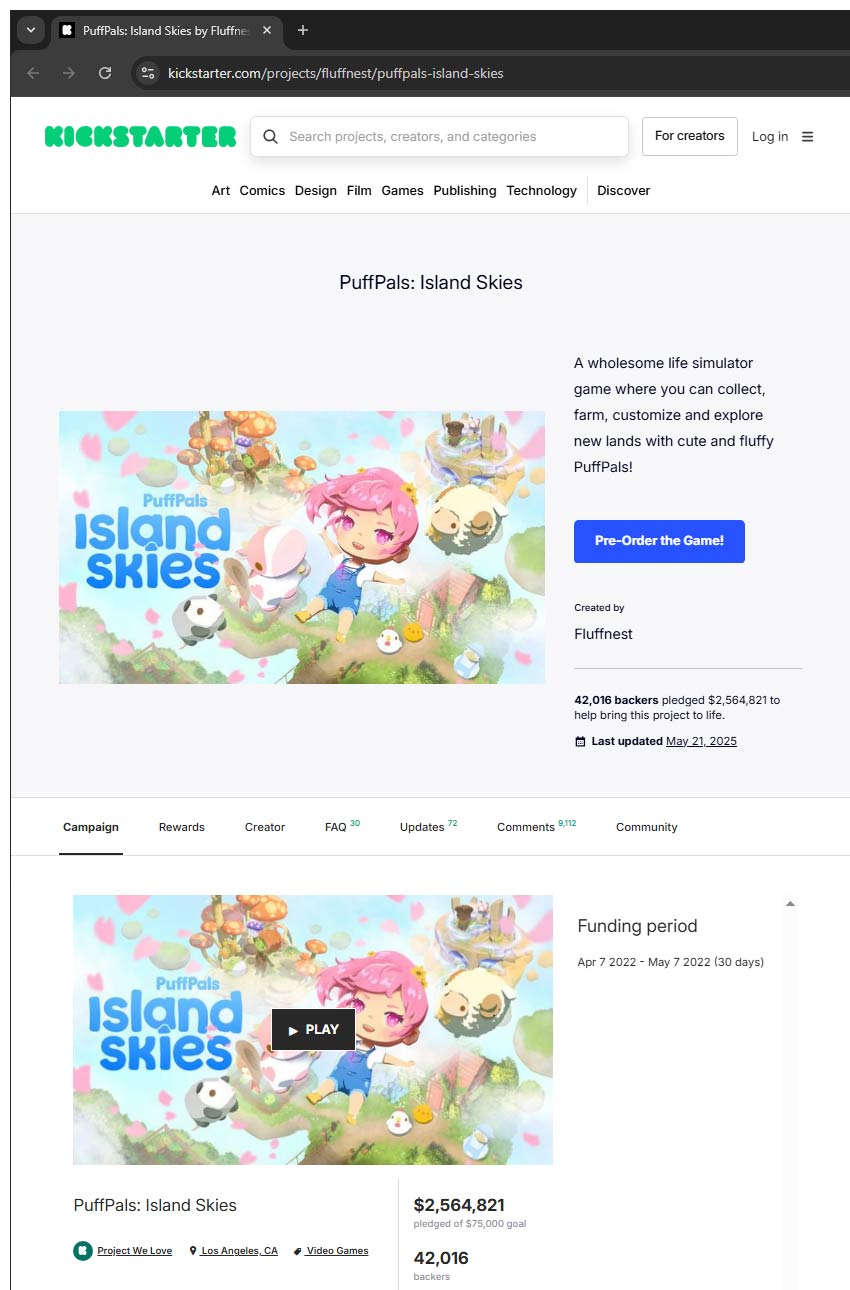It almost reads like a parody of the kind of "too-good-to-be-true" Kickstarter failure story: a cuddly branding, dreamy promises, "cozy" aesthetics and yet, in the middle of an increasing fame came a very messy ending.
What follows is a reconstructed narrative, enriched a bit with what’s surfaced online, of how a game so fluffy on paper ended up so thorny in practice.
When PuffPals: Island Skies launched on Kickstarter in April 2022, it presented itself as a gentle life sim in the mold of Animal Crossing or Harvest Moon. The funding goal was a modest $75,000, but the project quickly got attention and as a result, more than 42,000 backers pledged a total of $2.56 million, which is far exceeding that target.
The early buzz was fueled by the existing Fluffnest brand of plushies: people already loved the IP, the art, the soft aesthetics, and the promise of "bringing them to life" in a cozy game.
But things didn't go as planned, as the business model just went wrong for a lot of reasons.

At first, red flags were already in the fine print.
A large share of pledges didn’t just go toward game development but toward plushie "add-ons" and limited merchandise (some of which had previously sold out). The developers intended to be this way in order to save cost. So rather than spending money to create the merchandise from revenue, it opted to use existing money to fund it.
In other words, the millions of dollars were spent on logistical and fulfillment costs rather than pure development budget.
The outcome was evident.
Over the following years, the expected Kickstarter arc played out in tragicomic form: updates slowed, promises slipped, milestones were missed, communication dried up, and excuses piled up.
Backers posted questions in comments only to be met with vague statements about NDAs, internal restructuring, or third-party contractors.
Then, in May 2025, the final Kickstarter update claimed that a binding NDA prevented them from sharing many behind-the-scenes issues, and that management changes were underway. However, no concrete timetable or proof was given.
here’s our timeline! you can read our roadmap, too! you can find it here: https://t.co/NTRW1eUx4C pic.twitter.com/oXOSjrXLa0
— FLUFFNEST! (@fluffnest) June 9, 2024
Making things worse, the physical goods side of Fluffnest also began to unravel.
Customers reported missing shipments, inflated shipping prices, overcharges, and lack of refund responsiveness.
And to wrap everything up, the company’s flagship e-commerce store went dark. The game’s official website, once a cheerful hub, leads only to a domain-for-sale page.
Long story short, the plush business itself appears to have folded, if not crippled, with almost nothing left in stock.
On the legal front, things have also gotten ugly.
Fluffnest and its founders (David Pentland and artist usLily) are facing multiple lawsuits, including from contractors, merchants, and former employees, for unpaid invoices and breach of contract. One prominent case involves the studio Room 8, which was reportedly subcontracted to make the game itself. Room 8 claims it was never fully paid and has sued for $1.9 million.
Other smaller suits allege hundreds of thousands in owed debts to printers, service providers, and creators.
The CEO David is also facing a hearing over about $11,000 owed to a former internal artist.

It had a deadline, it promised to deliver, yet it failed. Now, even its website has gone dark.
With Fluffnest’s public presence evaporating and no visible infrastructure left to push the project forward, the outlook is bleak.
Realizing the blunders, a lot of its Kickstarter backers began demanding refunds. However, kickstarter pledging is legally a support promise. What this means,
While this may sound like a betrayal, but the fact about kickstarting is that there aren't any contract, and that any fund given is given, with no guarantee of refund. The courts may eventually issue judgments, but recovering money, especially from a company that appears insolvent or dismantling, is considered an impossible feat.
In other words, what started as a warm, fuzzy promise turned into ghosting, legal suits, unfulfilled dreams, and mounting suspicion, has now become a cautionary tale for the age of “cute indie dreams” and viral crowdfunding optimism.
